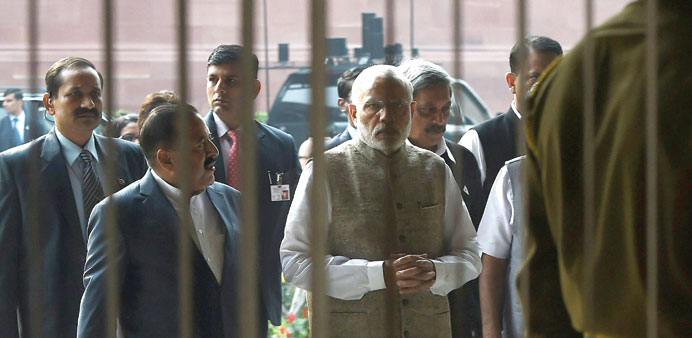Agencies/New Delhi
India’s secular principles are under threat, opposition Congress president leader Sonia Gandhi said yesterday as lawmakers paid tribute to the constitution and its makers.
The comments by Gandhi came as increasing numbers of intellectuals, artists and opposition parties have said the space for dissent and difference was shrinking under the Bharatiya Janata Party (BJP) government.
A number of writers, academics, filmmakers and others have returned state awards the past few months after a man was lynched by a mob that suspected he had stored beef at home, and at least two rationalist thinkers have been murdered.
The cow is considered holy by Hindus.
Critics have said Prime Minister Narendra Modi’s BJP has failed to rein in hardline Hindu leaders who have been making divisive remarks.
“The incidents of the past few months are totally against the values enshrined in the constitution,” Gandhi said. “The people who don’t have faith in the constitutional values are swearing by it ... what can be a bigger joke than that?”
The parliament opened yesterday for a month-long winter session that promises to be stormy.
The session began with a two-day special sitting to pay tribute to India’s constitution and its founders.
The constitution was adopted on November 26, 1949 and came into effect on January 26, 1950.
The BJP government has decided to observe November 26 as Constitution Day to spread awareness about the constitution and its architect B R Ambedkar.
In his address Home Minister Rajnath Singh said “secular” was the most misused word in politics, and that those who framed the constitution would have introduced “socialist and secular” in it if they had felt their need.
Singh, who initiated the debate on “Commitment to India’s Constitution” in the Lok Sabha, took veiled digs at the Congress in his speech, and also targeted Bollywood actor Aamir Khan over his remarks on intolerance.
He said Ambedkar had faced injustice and indifference due to social iniquities but kept control over his feelings and always presented an objective point of view.
“He (Ambedkar) never said how much he is being insulted in India. He said he will live in India for strengthening the country. He never thought he will go somewhere else,” Singh said.
His remarks drew protests from opposition benches but Speaker Sumitra Mahajan said there was nothing objectionable.
Singh said Ambedkar was the “binding force” for the country while the country’s first home minister, Sardar Vallabhbhai Patel, was the “unifying force”.
He said Ambedkar had felt that reservation for weaker sections was a “socio-political necessity”, and he made it clear that there would be no dilution in the policy.
Singh said the words “socialist and secular” were introduced in the constitution through the 42nd amendment. If the constitution makers had felt their need, they would have included them in the preamble.
Congress leader Mallikarjun Kharge sought to counter Singh, saying Ambedkar wanted to include these words in the preamble but did not do so in the prevailing atmosphere.
Singh, however, said Amedkar felt that secularism was in the basic nature of Indians and there was no need to mention it separately.
“In today’s politics, if a word has been misused the maximum, it is secular,” Singh said.
The home minister said the formal translation of secularism was not “dharam nirpeksh” (neutral of religion) but “panth nirpeksh (neutral of faith)”.
Singh said the “misuse of some words” had not allowed the country to have the level of harmomy that was sought to be built.
He also said that Ambedkar should not be seen just as a Dalit leader.
In Panaji, Congress parliamentarian Shantaram Naik said Singh should be sacked from the central cabinet as he had “violated oath of office by questioning insertion of ‘secular’ word in the Indian constitution”.
“Rajnath Singh has violated the oath of office by questioning in his speech in the Lok Sabha the insertion of ‘secular’ word in the constitution,” Naik, Goa’s lone Rajya Sabha member, said in a statement.

Prime Minister Narendra Modi arrives for the inauguration of an exhibition during the opening of the winter session of parliament in New Delhi yesterd
